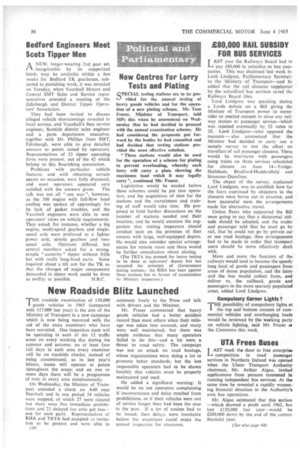280,000 RAIL SUBSIDY FOR BUS SERVICES
Page 38

If you've noticed an error in this article please click here to report it so we can fix it.
AST year the Railways Board had to pay £80000 in subsidies to bus companies. This was disclosed last week by Lord Lindgren, Parliamentary Secretar3 to the Ministry of Transport—and he added that the rail closures supplanted by the subsidized bus services saved the Railways Board £6m.
Lord Lindgren was speaking during a Lords debate on a Bill giving the Minister of Transport power to reconsider or rescind consent to close any railway station or passenger service—which was rejected eventually by 52 votes to 20. Lord Lindgren—who opposed the measure—also announced that the Minister had decided to carry out a sample survey to test the effect on travellers of rail passenger closures. There would be interviews with passengers using trains on three services scheduled for closure on June 14—EridgeHailsham, Bradford-Huddersfield and Stranraer-Dumfries.
The object of the survey, explained Lord Lindgren, was to establish how far the fears expressed by objectors to the closures were borne out in practice, and how successful were the arrangements made for alternative travel.
Unless Peers who supported the Bill were going to say that a dictatorial attitude should be adopted, and the trader and passenger told that he most go by rail, that he could not go by private car or use road haulage, then arrangements had to be made in order that transport users should he more effectively dealt with.
More and more the function of the railways would tend to become the speedy long haul of goods and passengers from areas of dense population, and the lorry and the bus would collect from, and deliver to, the railhead, goods and passengers in the more sparsely populated areas, added Lord Lindgren.
Compulsory Corner Lights ? THE possibility of compulsory lights at the top and bottom corners of commercial vehicles and overhanging loads would be reviewed by the workingparty on vehicle lighting, said Mr. Fraser 10 the Commons this week.
UTA Frees Buses
AST week the door to free enterprise competition in road passenger services in Northern Ireland was opened when the Ulster Transport Authority chairman, Mr. Arthur Algeo, invited applications from persons interested in running independent bus services. At the same time he revealed a rapidly worsening financial situation in the Authority's own bus operations.
Mr. Algeo estimated that this section —which showed a profit until 1962, but lost £120,000 last year—would be £200,000 down by the end of the current financial year.
























































































































